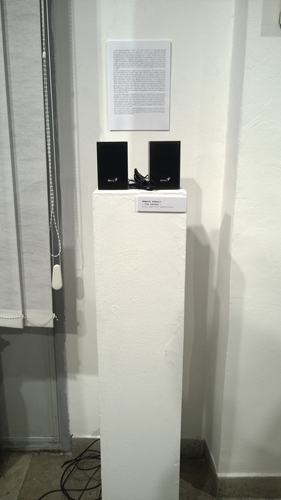Memories 60 Years Exhibition, 2016
The communist death camp at Recsk was operated between 1950 and 1953 by the Államvédelmi Hatóság (State Protection Authority), the number of detainees here was approx. 1500 people. Beside the three well-known labor camps (Tiszalök, Kazincbarcika and Kistarcsa), the one at Recsk was top secret. The internees (e.g. detainees without a court judgment) were considered even by their families disappeared/dead.
The prisoners were forced hard labor, starved and tortured. According to the memories of the detainees, hunger caused the greatest pain. The moldy bread intended for the captives was taken to the camp on the manure carriage cart, where a "brushing brigade" consisting of old prisoners had to bristle the mold from the breads. Even the mold was eaten, it was “not to be discarded”. The hungry internees saw meat when they were fed with peas with weevils in it. If they had the opportunity they tried to dig up the leftover bran beside the piggeries, also ate the oat fed to the horses. The prisoners caught by the guards were severely punished.
There were only 2 successful escapes from the death camp of Recsk. In the summer of 1950, József Dobó, reached Czechoslovakia, but gave himself up when he learned that his family was arrested. In May 1951, Gyula Michnay escaped with eight prisoners. A national arrest warrant was issued and they were captured all except Michnay, who fled to Vienna. Here, and later in Salzburg, nobody believed him. In the end, with the help of Edit Weiss (Manfréd Weiss's niece), he was able to read the list of prisoners of Recsk in the Free Europe Radio, in Munich. Only then many people in Hungary were informed about the whereabouts of their relatives presumed missing or dead.
Michnay enumerated 520 names from the heart because the prisoners could not possess paper or any writing tool in the camp, all information was to be kept in their minds or was to be learned (similarly to Ray Bradbury's novel Fahrenheit 451, written in 1953, where the banned books are learned by heart, word-to-word). The poems of György Faludy, who was also an internee at Recsk this time, were also learned by his fellow prisoners, and then later published with their help as a book (Prison Poems 1949-53, Munich, 1983).
The Recsk camp was actually a death camp, in contrast to other prisons or labor camps, the internees here had no hope for escaping alive. The valuables and clothes of the captives were sold by the guards right after their arrival and they joked that "they [the detainees] do not need to be accounted for". The camp was closed by Imre Nagy in 1953 (after Stalin's death) with all the other labor camps. This was probably due to the escape of Gyula Michnay and that the existence of the Recsk camp made public. The camp's buildings were destroyed, there was nothing left of them, their place was only identified after the end of communism in Hungary. The mass graves of the dead and murdered people have not been found until today.
Since the Michnay’s original list was lost, and there is no archive kept of the Free Europe Radio from this period, I have read 520 randomly selected names from the full list of detainees. The names come from the speakers, only voices without the help of any written text or visual information, just like in the Recsk camp.

